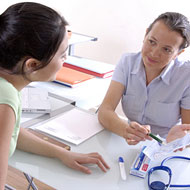- General Articles
- General Pregnancy Questions
- Baby Growth
- Pregnancy Diet
- Miscarriage
- During Pregnancy
- Twin Pregnancy
- Toddler Meals
- Home Remedies During Pregnancy
- Breastfeeding
- Pregnancy Week By Week
- Pregnancy Tests
- Ectopic Pregnancy
- Pregnancy Signs and Symptoms
- Pregnancy Stages
- Potty Training
- Fetal Development
- Preschooler
- Postpartum Depression
- Toddler Illness
- Baby Care
- After Pregnancy
- Molar Pregnancy
- During Delivery
- Beauty and Style
- Pregnancy Clothing
- Preconception
- Fertility
Risks of Getting Pregnant After 35
With the advances in medical science today, getting pregnant after the age of 35 is not the high risk proposition that it was, say 20 years ago. This article examines the chances of a woman getting pregnant after the age of 35 along with the precautions that need to be taken, while minimizing the health risks to both the mother and the baby.
Apart from complications during pregnancy, women in their thirties experience a decline in their fertility levels. The decline in fertility levels can be attributed to a number of factors which include:
- A decline in the number of eggs produced
- Hormonal changes that affect ovulation
- Scar tissue formation around the ovaries or fallopian tubes due to infections or surgery
- Fibroid or uterine disorders
- A decrease in the sperm count of partners (assuming of course that both partners are of the same age group)
- Decreased frequency of sexual intercourse
- Age-related gynecological complications such as endometriosis that may interfere with conception
While these factors lessen the chances of conception, it still remains possible for a woman over the age of 35 to conceive. With the advancement in medical treatment and care, many older women are getting pregnant.
They have safer pregnancies with fewer complications than in the past.
If you are contemplating having a child after the age of 35, then you should be aware of the risks and take all the necessary precautions needed to minimize them.
So what are the risks of getting pregnant after the age of 35?
- Risk of birth defects: The risk of birth defects increase with an increase in the mother's age. This is usually caused by abnormal division of the fertilized egg known as nondisjunction. Downs syndrome is the most common chromosomal birth defect. Its incidence increases to 1 in 400 for women aged 35 as compared to 1 in 1250 for women aged 25. The incidence is even higher for women in their 40s.
- Risk of miscarriage: The risk of miscarriage also increases with age from about 12% for women in their 20s to 20% for women in their late 30s and 35% for women in their early to mid 40s.
- Risks due to health problems: Chronic health problems such as hypertension, diabetes and liver and kidney disease are more common in older women. These conditions pose a risk to the health of both mother and child and need to be under control. Proper care and regular monitoring of these conditions are essential to lower the risks associated with these conditions.
- Risk of developing diabetes and hypertension: Women over the age of 35 are at increased risk of developing diabetes and hypertension during their pregnancy.
- Risk of delivering a stillborn baby: Stillbirths are almost 2 to 3 times as likely in women over the age of 35 as compared to women in their 20s.
- Risk of premature delivery: The risk of premature delivery also increase with age, increasing from 11.9% for women in their 20s to 16.6% for women over the age of 40.
- Risk of low birth weight: Some studies suggest that older women have an increased chance of giving birth to babies weighing less than 5 ½ pounds.
- Risk of cesarean birth: The incidence of cesarean delivery increases to almost 40% for women over the age of 35.
Despite the increased risk, many women today are getting pregnant late in life and delivering healthy babies. If you are over 35 and are contemplating getting pregnant, then you should take certain precautions that will minimize these risks. These precautions include:
- Have a complete health checkup before you conceive.
- If you suffer from any chronic health problems such as diabetes or hypertension, make sure that they are well under control.
- Start taking a multivitamin with at least 400 mcg. of folic acid every day starting before you get pregnant.
- Get your weight under control before you get pregnant.
- Stop smoking and avoid second hand smoke.
- Do not take any kind of drugs or medications including over the counter medicines unless it is for a pre-existing condition and has been prescribed by your doctor.
- Avoid drinking alcohol, coffee and beverages containing caffeine.
- Eat a healthy well-balanced diet and limit your calorie intake to avoid putting on too much weight.
Consult your doctor about the risks involved in getting pregnant as well as the precautions you need to take.
Read more articles from the During Pregnancy Category.



 7 Must-Haves Before Your Baby Arrives
7 Must-Haves Before Your Baby Arrives Bonding Games for Babies
Bonding Games for Babies DIY Baby Bath Towel Apron
DIY Baby Bath Towel Apron Common Late Pregnancy Fears
Common Late Pregnancy Fears